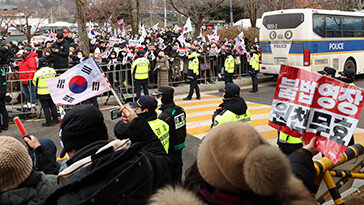International Airport last December for her flight to Los Angeles-except for the
fact that she was 8 1/2 months pregnant. The airline made her sign a waiver in
case she went into labor during the 12-hour passage. It was a risky trip, but
Young Jin (who doesn't want her family name in print) was flying to deliver her
unborn child from Korea's hellish school system.
Koreans are education zealots, partly because of Confucian tradition but also
because a degree from a top university is a passport to status and a comfortable
life. The problem is that getting into good Korean universities has become so
competitive that parents are going great distances to let their kids avoid the
whole stressful mess. The favorite ticket is to get them American citizenship,
which is guaranteed to anyone born on U.S. soil. Dr. Kim Chang Kyu, an
obstetrician practicing in a rich neighborhood in Seoul, estimates that every
year thousands of women are going to the U.S. to deliver babies-not to migrate
but to get their children the document that, 17 years hence, might allow them a
shot at a place in a U.S. university.
Travel agencies are offering three-to four-month package childbirth tours, which
include airport transfers, an apartment to live in before and after the delivery,
medical treatment at clinics catering to Koreans, sightseeing and assistance in
getting a birth certificate and passport for the newborn. Total cost: $20,000.
Young Jin, who didn't go on a tour, had a hard time doing the paperwork on her
own. But seven weeks after landing, she had what she wanted-a bouncing baby boy
with an American passport. The two happily returned to Seoul. "I want my child to
have time to play, like a normal kid," she says. If she had to worry about his
getting into Korean universities, Young Jin's son would have been in cram school
by age 7.
A U.S. passport doesn't get anyone into college or pay the tuition bills after
admission. But in Korea it's viewed as an insurance policy: if a kid falters in
the tough, local system, he can pick up and move and get onto the easier American
path. A 34-year-old mother who had her second child in Boston two years ago (and
who asked not to be identified) says she simply wanted a better education for her
child when he gets to school age. "The American system is better than the Korean
in every way you can imagine," she says.
The U.S. State Department isn't crazy about the trend, but tourist visas are
given freely to well-heeled Koreans who don't appear to be illegal alien risks.
Some airlines don't let women in advanced stages of pregnancy on aircraft, but
others, such as Korean Air and Air France, are more accommodating.
According to Arugus Lee, CEO of Los Angeles' Hana Medical Center, which delivers
at least five babies from Korean visitors a month, education is but one of three
reasons they come to deliver. The others: parents think their children will end
up working in the U.S. at a good job; and that the kids can avoid South Korea's
mandatory 26-month military duty. That's produced some heat: travel agencies that
arrange the tours tend to be secretive and do most of their business by e-mail.
Few mothers want to go public with their experience. But most mothers insist
they're not being unpatriotic by delivering abroad. They say that unlike other
foreign nationals who want passports or green cards to escape their home
countries, they're not abandoning South Korea. Life there suits them just fine
except for one thing: school sucks.
-
- ???
- 0?
-
- ???
- 0?
-
- ???
- 0?


